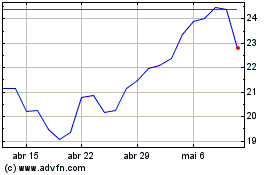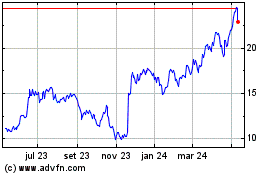YPF Can Finance Maxus' Bankruptcy Plan, Judge Says
15 Agosto 2016 - 10:40PM
Dow Jones News
A bankruptcy triggered by the high cost of cleaning up New
Jersey's contaminated Passaic River inched forward with an
agreement to finance Maxus Energy Corp.'s workout effort.
On Monday, Judge Christopher Sontchi of the U.S. Bankruptcy
Court in Wilmington, Del., indicated he would approve an
approximately $63 million bankruptcy financing package that was
amended after creditors expressed concerns.
Heading into Monday's hearing, Maxus creditors warned the
financing would give Maxus's parent and lender, YPF SA, Argentina's
state-run oil company, too much power to force through a bankruptcy
settlement that takes YPF off the hook for damages from the
contamination of the Passaic River.
Maxus was one of dozens of companies tagged with blame for
discharging hazardous substances into the river decades ago. A New
Jersey state court has ruled that Maxus and an affiliate were
responsible for dumping dioxin, a highly toxic chemical and
suspected carcinogen, into the river in the 1950s and 1960s.
YPF and Maxus agreed to pay New Jersey $130 million to settle
most of the pollution claims in 2013. Cleanup costs for an
eight-mile area of the river range from $1 billion to $3.4 billion,
according to the Environmental Protection Agency.
Maxus Energy filed for chapter 11 bankruptcy protection in June,
hoping to cement a settlement with its parent for $130 million to
cover its environmental obligations. In return, YPF would be
released from legal claims Maxus may have against it in relation to
the cleanup costs.
While the fight over Maxus' bankruptcy financing was resolved
through agreements, the fight over the YPF settlement will continue
in bankruptcy court. If Maxus and YPF prevail, the settlement will
be incorporated in a chapter 11 exit plan.
YPF bought Maxus in 1995. Along with Maxus' oil fields, YPF also
acquired the company's legal liabilities, including those growing
out of the operation of a chemical plant along the river decades
ago. A pesticide plant in Newark produced the Vietnam War-era
defoliant Agent Orange and DDT before being shut down years
ago.
Other companies have been called on to help fund the cleanup of
the Passaic River, which was a major industrial artery with
chemical, paint and other factories. A group of those companies
occupies a seat on the official committee of unsecured creditors in
Maxus' bankruptcy and is watching the proceeding intently, a lawyer
for the group said.
Maxus' bankruptcy financing will cover continued cleanup work,
an obligation YPF must meet. The controversial portion of the
financing was a loan that will mostly be spent on professional fees
of lawyers and advisers working to get the settlement approved,
fees that could top $20 million.
Occidental Chemical Corp., the Occidental Petroleum Corp.
chemical subsidiary that's also known as OxyChem, has been trying
to hold YPF to account for a share of the cleanup costs. OxyChem
lawyer Christopher Shore said the bankruptcy financing threatened
to add to Maxus' financial problems, not relieve them.
Maxus is asking to borrow in bankruptcy more than it can repay,
Mr. Shore said, a factor that effectively gives YPF a veto power
over the wishes of other creditors.
The official committee of unsecured creditors was also concerned
about the concentration of bargaining power in YPF's hands, said
Adam Harris, lawyer for the group.
YPF agreed to limit its repayment rights under the loan to set
the financing up for approval.
Patrick Fitzgerald contributed to this article.
Write to Peg Brickley at peg.brickley@wsj.com
(END) Dow Jones Newswires
August 15, 2016 21:25 ET (01:25 GMT)
Copyright (c) 2016 Dow Jones & Company, Inc.
YPF Sociedad Anonima (NYSE:YPF)
Gráfico Histórico do Ativo
De Dez 2024 até Jan 2025

YPF Sociedad Anonima (NYSE:YPF)
Gráfico Histórico do Ativo
De Jan 2024 até Jan 2025
